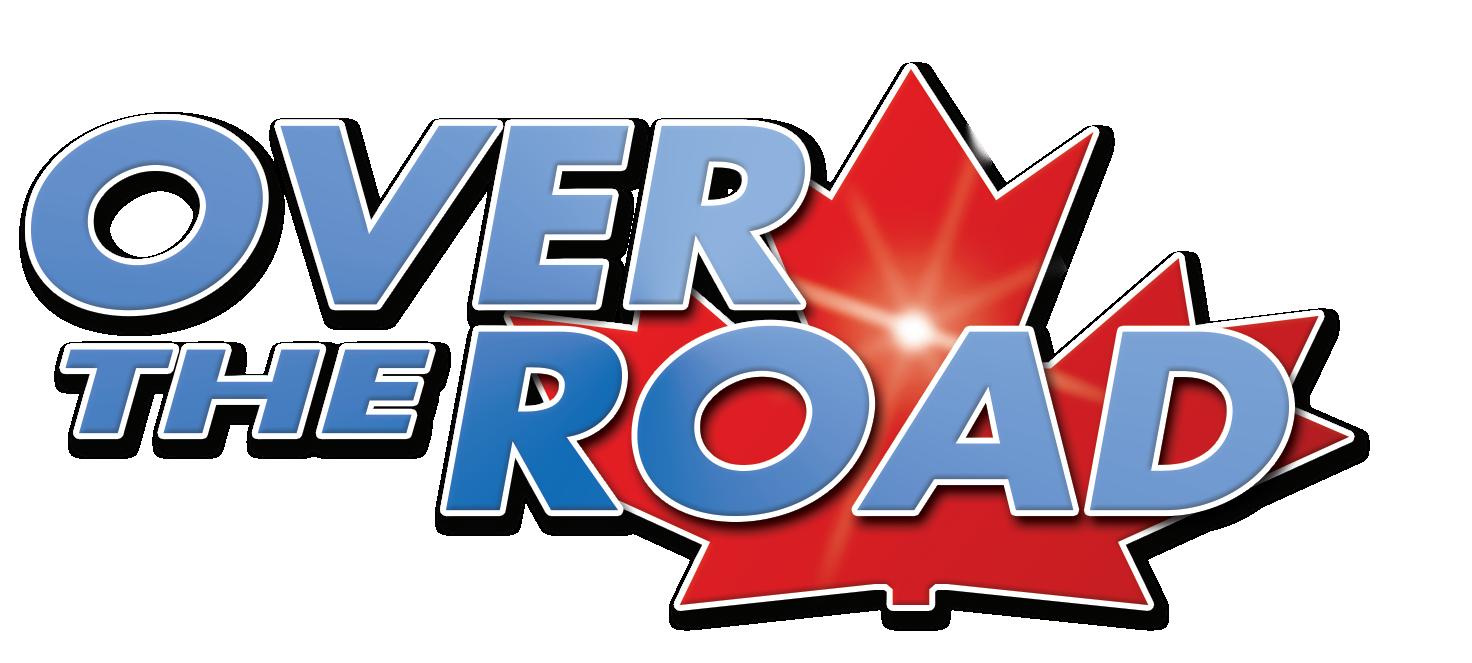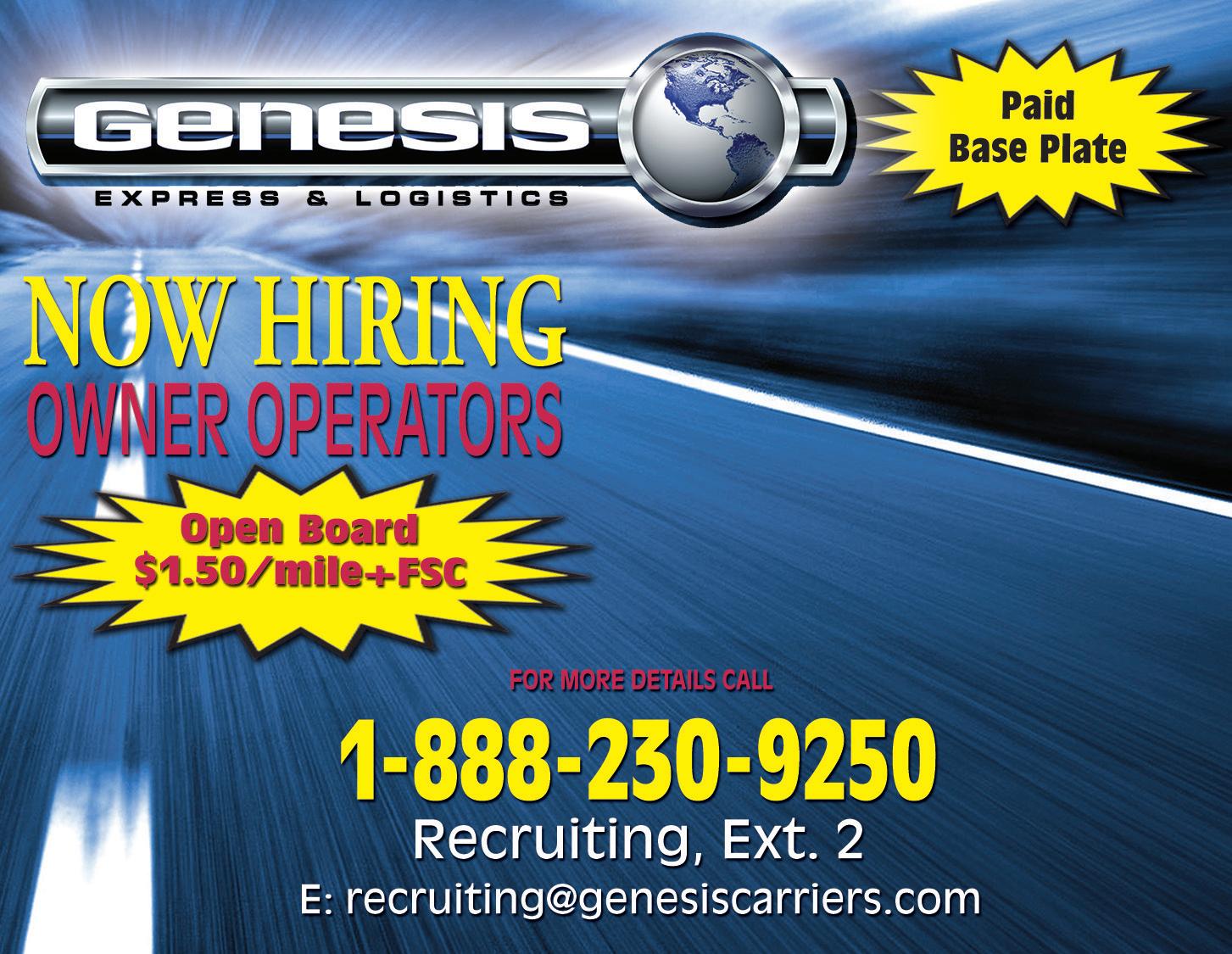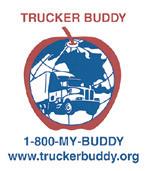






WE ARE HIRING:
• COMPANY DRIVERS A-Z

• OWNER OPERATORS A-Z, D-Z
• DISPATCHER • LOCAL DISPATCHER
• DISPATCH ASSISTANT
• DATA ENTRY/CUSTOMS СLERK
• MECHANIC
Why us? Contact us today!
At Transam Carriers, we believe that success is not achieved without professional human attitudes. We are proud of providing some of the most flexible work options in the industry for an optimum work-life balance. All of these, in conjunction with new equipment, modern technologies, in-house truck shop, and cross-dock facility, make Transam an exceptional workplace that we call here our second home.



Publisher
Peter Charboneau peter@otrgroup.ca
Director of Operations & Editor-in-Chief
Cathryn Charboneau cathryn@otrgroup.ca
Account Executive Luke Zentil luke@otrgroup.ca
Account Executive



Earle Madden earle@otrgroup.ca


Graphic Design & Advertising

lennykuiper.com
lennykuiper@gmail.com

Controller Estela Navarrete estela@otrgroup.ca
Office Manager Mary Charboneau mary@otrgroup.ca
All advertisements, and/or editorials are accepted and published by Over the Road on the representation that the advertiser, its advertising company, and/or the supplier of the editorials are authorized to publish the entire contents and subject matter thereof. The advertiser, its advertising company, and/or the supplier of the editorials will defend, indemnify and hold Over the Road harmless from and against any loss, expense or other liability resulting from any claims or suits for libel, violation of privacy, plagiarism, copyright or trademark infringement and any other claims or suits that may rise out of publication of such advertisement and/ or editorials. Press releases are expressly covered within the definition of editorials.















So, when is a good time to get into the independent operator business? With fuel prices still high and freight rates not what they used to be; many are asking: should I become an operator now? The short answer is probably no, but the full answer may be “now is the perfect time”. In making a good choice we must accept that there are many circumstances that determine both success and failure. If nine out of ten show a good opportunity but the one problem area makes the whole opportunity vulnerable… we probably chose based on the one negative variable, not the nine. However, sometimes there are five negative things and five positive things and it’s well worth the investment. Each circumstance weighs differently, sometimes in combination with other circumstances. For instance, if you get 7.5 MPG and the formula for fuel subsidy at the carrier you are with is calculated at 6.5 MPG, the higher the market fuel cost goes… the MORE margin and money you make (a perfect opportunity). But if your truck only gets 5.75 MPG, the circumstances say NO-NO-NO. However, there are a few circumstances that are universally good no matter what the external circumstances. I know one
guy who stumbled across an awesome 7 MPG truck for $5,000 (plus $6K to safety) making it a smoking hot deal. Another obvious example is non-taxable benefits. Every long-distance operator has the opportunity to save $12,000 per year in taxes no matter what the other circumstances are: truck cost/value, freight rates, fuel economy of the truck, market fuel costs etc. It’s the one constant the industry can provide and yet far too few operators use it or even know about it. It is what I wrote about in my first book in 2007, over 15 years ago.

Mark Twain once stated, “It ain’t what you don’t know that gets you into trouble. It’s what you know for sure that just ain’t so”. This quote is only half ‘perfect’ (if there is such a thing). Most operators and those who prepare taxes don’t know about NTB (Non-Taxable Benefits), but they ‘know for sure’ that how they are preparing taxes is the best method… and yet it “...just ain’t so”. It’s what they ‘don’t know’ (NTB) that gets them in trouble… if you define trouble as paying too much in taxes.
I had an interesting conversation with an operator the other week. He stated, “all contracts from carriers end up being the

same anyway”. Again... it “just ain’t so”. Just as my second book showed in its research that the difference between the best and worst carrier in 1996 is $1,800 per month cash flow and in the research in 2012, the number was over $3,000, so we need to realize facts don’t lie but guesses usually mislead. Remember, not all carriers pay the same for different reasons and often because the responsibilities can vary dramatically. The operator responsibilities between dry van, livestock and dangerous good tankers are obvious and dramatic. Thinking they will be paid the same is very naive.
It is for this reason that learning your industry is critical to running a successful business. It is far too expensive to learn things by ‘trial and error’ or ‘on your own’. You must be able to search out and gain insight so you can avoid costly ‘tuition to the school of hard knocks’. Thomas Sowell had a great saying (paraphrased), “If you only learn by experience, then, by the time you’re 50, you should know all you need to know when you were 25”. We MUST learn from other people’s mistakes or from honest factual calculations. In business, there are very few situations where we can ‘figure it out later, after the fact’ and still survive.
If you really want to learn and understand… READ. If you don’t have time to read… listen to wise PODCASTS. If you don’t want to apply yourself… you should stay as a company driver. Being in business requires continual learning and adapting.
Look into the Making Your Miles Count Podcasts on our website… the leading industry site for becoming successful in this business.

About the Author:
Robert D. Scheper is a leading Accountant and Consultant exclusively serving the Lease/Owner operator industry in Canada. His first book in the Making Your Miles Count series “taxes, taxes, taxes” was released in 2007. His second book “Choosing a Trucking company” is the most in-depth analysis of the independent operator industry today. He has a Master’s degree (MBA) in financial management and has been serving the industry since he and his wife came off the road in 1993. His dedication, commitment and strong opinions can be read and heard in many articles and seminars.
You can find him at www.makingyourmilescount.com or 1-877-987-9787.









SAFETY
Chris HarrisIs it just me, or do you see it as well? When I observe truck drivers at the beginning of their shifts, they are speedy in doing their vehicle inspection. I have never seen a driver take 30 minutes to inspect a tractor and trailer. I have seen some truck drivers, when they know they are being watched, take about 15 minutes to check a tractor and trailer. I have also seen vehicle inspections on ELD reports as short as three minutes.
I hope we can all agree that no truck driver, and for that matter, no passenger vehicle driver, starts the day thinking or planning that they will get a ticket. Yet every day, officers hand out violations and tickets to well-intended drivers.
When I review a company’s safety score, I see this frequently - silly violations which would be caught with an adequate vehicle inspection.
What types of breaches am I referring to? I think most truck drivers, if they do a vehicle inspection, notice headlights not working. Would you agree? I often review safety scores and make a note of light violationsthis is the type of violation that happens frequently. So frequently, in fact, that I believe that the light didn’t just ‘burn out’ since the last vehicle inspection was completed. Another example would be that the driver ‘does not have ELD instructions’ or, how about not ‘signing’ your ELD? There are numerous examples that I could cite that indicate that many drivers are failing to perform a bare minimum type of vehicle inspection.



Every truck driver knows they must perform a Daily Vehicle Inspection and complete a report (DVIR). This inspection must be completed once every 24 hours in Canada and documented. A lot of evidence shows

there is a real lack of knowledge on how to do a DVI or, a lack of willingness to perform an inspection.
I know that truck maintenance has generally gotten better over the years and LED lights don’t burn out as often as in the past. But I am asking, and I really want to know why truck drivers fail to inspect their vehicles.
When I conduct a truck driver on-road evaluation (road test), many drivers show me a very poor inspection. They have forgotten the basics of a vehicle inspection. They usually take a good look ‘under the hood’ but most fail to turn on ‘all’ lights. Truck drivers often forget to check their high beams and fog lights. Most of the drivers I review don’t know where the first aid kit is located. They seldom check the fire extinguisher, especially the fire extinguisher securement. These are just some of the basics that are missed. I won’t talk about how truck drivers can do an entire vehicle inspection and won’t mention ‘air’ or ‘brake stroke’. (Oh, I guess I did say it.)
I would love to hear why truck drivers fail to perform adequate inspections. Please tell me. Some of the reasons I can think of are, ‘I’m not paid to do it’. Or is it ‘it is not my job; it

is mechanics work’. How about ‘I checked it yesterday’?
What are the reasons for terrible vehicle inspections, or what did I not think of? Please send me an email telling me your opinion as to why? If I understand the ‘why’, I could address the reason with company owners and truck drivers. I appreciate your help.
Stay safe.
Chris Harris Top Dawg,Safety Dawg Inc. 905-973-7056
chris@safetydawg.com
@safety_dawg (twitter)

During this time of crisis, we need to ensure two things continue to happen:
● Continued transportation of vital goods and necessary food items.
● Open communication with drivers, dispatchers, and other employees.



We are offering 30-day complimentary access to our system to assist companies in maintaining driver safety training, including tracking and reporting. The Coronavirus pandemic has proven the critical need to Limit face-to-face interaction between employees. But how can your company encourage remote work and still bring on new drivers safely and effectively? How can you keep your drivers up to speed on safety content that would traditionally be covered in safety meetings?
Remote online training allows you to do both:
● Ensures participation and comprehension
● Consistently delivers important elements of your orientation
● Quickly gets your trucks moving safely
● Saves time, resources and money
● Simple to implement quickly and with very little effort on your part
There are no shortcuts when it comes to consistency and quality Infinit-I Workforce Solutions offers a communication and learning management system that allows you to simplify orientation through remote, online training. Spread Coronavirus awareness by distributing messages and policies from your company to your entire fleet.
Take advantage of our 30-day Complimentary Trial efficiency of your orientation. Keep your company moving!

to increase the
For additional Coronavirus resources for Trucking & Logistics, visit https://www.infinitiworkforce.com/ppc/comp-access-cn-2/ www.infinitiworkforce.com
“Amazing support staff.”
Sixteen years ago, when the Women In Trucking Association was formed, the response from the trucking industry was positive. They were more interested in using an untapped resource (women) to fill seats (both Board seats and truck seats) than hiring women, but increasing the ranks of women was a welcome solution. The typical comment from carriers was that they always hired the best person, regardless of gender, age, or ethnicity.



However, they weren’t as sensitive to how the trucking industry environment didn’t embrace the challenges women faced when they tried to fit into a male-populated workplace. In the past, trucks were designed for men, showers and truck stop facilities were designed for men, and even the uniforms were meant to fit men.
Women were eager to adapt to the workforce and wore the men’s shirts, asked a friend to monitor the shower, and used pillows on the seat to see over the dash in the truck. Without power
Ellen Voiesteering or power brakes, the job was strenuous, but women were up to the challenge.
Some of the women who entered the trucking industry decades ago were tough and deflected any harassment from their male counterparts. These women worked hard to fit in and to not receive any attention for being a woman in trucking. In fact, their goal was to do their job and to not be noticed.
Some of these women have turned into Queen Bees. They clearly do not support or accept the women who are entering the industry today. In fact, they are resentful of the changes their generation has worked for to make trucking a more gender-diverse industry.
For example, one of our Image Team Members was advocating for healthier food options at truck stops and convenience stores. Some of the more seasoned female drivers gave her a hard time for being concerned with something they felt was
insignificant. However, if our drivers (both men and women) want healthier food choices, then they should feel free to voice their opinion.
So, what is a Queen Bee, and why are they detrimental to the trucking industry? According to Wikipedia, a Queen Bee is “a derogatory term applied to women who have achieved success in traditionally male-dominated fields. These women often take on ‘masculine’ traits and distance themselves from other women in the workplace to succeed. They may also view or treat subordinates more critically if they are female and refuse to help other women rise in the ranks as a form of self-preservation.”
Why is this important to the trucking industry? When we approach seasoned female drivers and ask them to consider joining the Women In Trucking Association, the response I get from these women is typically, “You weren’t here for me when I started in this industry, why should I support you?”
My response is always to acknowledge their contribution to the industry and to ask them to share their wisdom with the women entering the industry for the first time. This usually works, as they want to be acknowledged for their efforts.
The takeaway is that we need to honor and elevate the women who have been in the trucking industry for decades. They were trailblazers and should be recognized for their efforts. As more women enter the trucking industry, it will change, and the pioneers who paved the way for today’s female drivers should be thanked and appreciated.

To all the Queen Bees in the trucking industry, we are grateful and ask for your insight in making the environment better for the next generation of female drivers.
Ellen Voie President/CEO/Founder of Women In Trucking, Inc. ellen@womenintrucking.orgwww.womenintrucking.org
Mission: Women In Trucking was established to encourage the employment of women in the trucking industry, promote their accomplishments and minimize obstacles faced by women working in the trucking industry.





Get into a job you enjoy by searching through hundreds of driving jobs across Canada and the US!
Drivers and Owner Operators, apply to leading trucking companies in minutes!
It is absolutely FREE, easy and simple to use. Check it out today!












